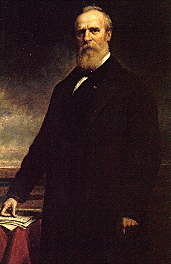Carl Schurz
| Carl Schurz | |
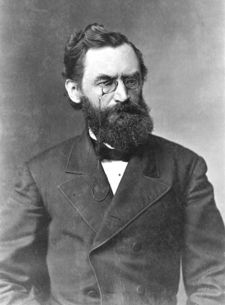 |
|
|
13th United States Secretary of the Interior
|
|
|---|---|
| In office March 12, 1877 – March 7, 1881 |
|
| President | Rutherford B. Hayes |
| Preceded by | Zachariah Chandler |
| Succeeded by | Samuel J. Kirkwood |
|
|
|
| In office March 4, 1869 – March 3, 1875 |
|
| Preceded by | John B. Henderson |
| Succeeded by | Francis M. Cockrell |
|
United States Ambassador to Spain
|
|
| In office July 13, 1861 – December 18, 1861 |
|
| President | Abraham Lincoln |
| Preceded by | William Preston |
| Succeeded by | Gustav Körner |
|
|
|
| Born | March 2, 1829 Liblar, Germany |
| Died | May 14, 1906 (aged 77) New York City, New York |
| Political party | Republican |
| Spouse(s) | Margarethe Meyer |
| Alma mater | University of Bonn |
| Profession | Politician Lawyer Journalist |
| Religion | Catholic |
| Signature |  |
| Military service | |
| Allegiance | Forty-Eighters United States of America |
| Service/branch | Union Army |
| Years of service | 1848 1862 - 1865 |
| Rank | Major General |
| Battles/wars | Revolutions of 1848 American Civil War |
Carl Schurz (German pronunciation: [ˈkaʁl ˈʃʊʁts]; March 2, 1829 – May 14, 1906) was a German revolutionary, American statesman and reformer, and Union Army General in the American Civil War. He was also an accomplished journalist, newspaper editor and noted orator, who in 1869 became the first German-born American elected to the United States Senate.[1]
His wife, Margarethe Schurz, and her sister, Berthe von Rönge, were instrumental in establishing the kindergarten system in the United States.[2] During his later years, Schurz was perhaps the most prominent independent in American politics, noted for his high principles, his avoidance of political partisanship, and his moral conscience.[3]
He is famous for saying: "My country, right or wrong; if right, to be kept right; and if wrong, to be set right."[4] Many streets, schools, and parks are named in honor of him, including New York City's Carl Schurz Park.
Early life
Schurz was born in Liblar (now part of Erftstadt), Germany on March 2, 1829, the son of a schoolteacher. He studied at the Jesuit Gymnasium of Cologne, and also studied the piano under private instructors. Financial problems in his family obligated him to leave school a year early, without graduating, so he could help sort out his family's tangled financial affairs. Later he graduated from the gymnasium by passing a special examination and entered the University of Bonn.
At Bonn, a friendship developed with one of his professors, Gottfried Kinkel, that was to much influence his life for the next few years. He joined the nationalistic Studentenverbindung Burschenschaft Franconia at Bonn, which at the time included Friedrich von Spielhagen, Johannes Overbeck, Julius Schmidt, Carl Otto Weber, Ludwig Meyer and Adolf Strodtmann among its members.[5] The fraternity experience was valued, and he later joined the New York Alpha Chapter of the Phi Kappa Psi Fraternity at Cornell University and the Irving Literary Society,[6] sponsored by his former comrade-in-arms, Joseph Benson Foraker. In response to the early events of the revolutions of 1848, Schurz and Kinkel started the Bonner Zeitung, a paper advocating democratic reforms. At first Kinkel was the editor and Schurz a regular contributor. These roles were reversed when Kinkel left for Berlin to become a member of the Prussian Constitutional Convention.[7] When the Frankfurt rump parliament called for people to take up arms in defense of the new German constitution, Schurz, Kinkel, and others from the University of Bonn community did so. During this struggle, Schurz became acquainted with Franz Sigel, Alexander Schimmelfennig, Fritz Anneke, Friedrich Beust, Ludwig Blenker and others, many of whom he would meet again in the Union Army during the U.S. Civil War.

During the 1849 military campaign in Palatinate and Baden, Schurz was adjunct officer of the commander of the artillery, Fritz Anneke, together with Annekes wife, Mathilde Franziska Anneke. The Annekes would later move to the U.S. as well where both supported the Republican Party of Abraham Lincoln (Annekes brother Emil Anneke was one of the founders of the Republican party in Michigan and later served as Auditor General of Michigan.). Fritz became colonel and commanding officer of the 34th Wisconsin Volunteer Infantry Regiment during the Civil War, and Mathilde a very important personality in the abolitionist and suffrage movements within the United States.
The revolution in Germany ultimately failed. When the fortress at Rastatt, the last holdout, surrendered with Schurz inside, Schurz escaped to Zürich. In 1850, he returned secretly to Prussia, rescued Kinkel from prison at Spandau and helped him to escape to Edinburgh, Scotland. Schurz then went to Paris, but the police forced him to leave France on the eve of the coup d'état of 1851, and he moved to London. Remaining there until August 1852, he made his living by teaching the German language. He married fellow revolutionary Johannes Ronge's sister-in-law, Margarethe Meyer, in July 1852 and then moved to America. Living initially in Philadelphia, Pennsylvania, the Schurzes moved to Watertown, Wisconsin, where Carl nurtured his interests in politics and Margarethe began her seminal work in early childhood education. Schurz is probably the best known of the Forty-Eighters, the German emigrants who came to the United States after the failed liberal revolutions.
Politics in the United States
In 1855, Schurz settled in Watertown, Wisconsin, where he immediately became immersed in the anti-slavery movement and in politics, joining the Republican Party of Wisconsin. In 1857, he was an unsuccessful Republican candidate for lieutenant-governor. In the Illinois campaign of the next year between Abraham Lincoln and Stephen A. Douglas, he took part as a speaker on behalf of Lincoln—mostly in German—which raised Lincoln's popularity among German-American voters. Later, in 1858, he was admitted to the Wisconsin bar and began to practice law in Milwaukee. In the state campaign of 1859, he made a speech attacking the Fugitive Slave Law and arguing for state's rights. Outside of the state, in Faneuil Hall, Boston, on April 18, 1859,[8] he delivered an oration on "True Americanism," which, coming from an alien, was intended to clear the Republican party of the charge of "nativism". The Germans of Wisconsin unsuccessfully urged his nomination for governor by the Republican party in 1859. In the 1860 Republican National Convention, Schurz was spokesman of the delegation from Wisconsin, which voted for William H. Seward; despite this, Schurz was on the committee which brought Lincoln the news of his nomination.
Civil War
In spite of Seward's objection, grounded on Schurz's European record as a revolutionary, Lincoln sent him in 1861 as ambassador to Spain. He succeeded in quietly dissuading Spain from supporting the South. Persuading Lincoln to grant him a commission in the Union army, Schurz was commissioned brigadier general of Union volunteers in April, and in June took command of a division, first under John C. Frémont, and then in Franz Sigel's corps, with which he took part in the Second Battle of Bull Run. He was promoted major general of volunteers on March 14 and was a division commander in the XI Corps at the Battle of Chancellorsville, under General Oliver O. Howard, with whom he later had a bitter controversy over the strategy employed at that battle, resulting in their defeat by Thomas J. "Stonewall" Jackson. He was at Gettysburg (a victory for the Union) commanding the Third Division of Howard's XI Corps, and at Chattanooga (also a victory for the Union side), at which he served with the future Senator Joseph B. Foraker, John Patterson Rea, and Luther Morris Buchwalter, brother to Morris Lyon Buchwalter. Senator Charles Sumner (R-MA) was a Congressional observer during the campaign. Later, he was put in command of a Corps of Instruction at Nashville. He briefly returned to active service, where in the last months of the war when he was with Sherman's army in North Carolina as chief of staff of Henry Slocum's Army of Georgia. He resigned from the army when the war ended.
Postbellum politics
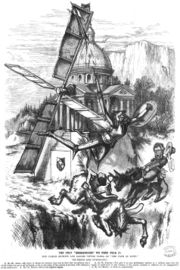
In the summer of 1865, President Andrew Johnson sent Schurz through the South to study conditions; they then quarrelled because Schurz approved General H.W. Slocum's order forbidding the organization of militia in Mississippi. Schurz's report, suggesting the readmission of the states with complete rights and the investigation of the need of further legislation by a Congressional committee, was ignored by the President. In 1866, Schurz moved to Detroit, where he was chief editor of the Detroit Post. The following year, he moved to St. Louis, becoming editor and joint proprietor with Emil Praetorius of the Westliche Post (Western Post), where he hired Joseph Pulitzer as a cub reporter. In the winter of 1867-1868, he travelled in Germany – the account of his interview with Otto von Bismarck is one of the most interesting chapters of his Reminiscences. He spoke against "repudiation" (of war debts) and for "honest money" (the gold standard) during the Presidential campaign of 1868.
In 1869, he was elected to the United States Senate from Missouri, becoming the first German American in that body. He earned a reputation for his speeches, which advocated fiscal responsibility, anti-imperialism, and integrity in government. During this period, he broke with the Grant administration, starting the Liberal Republican movement in Missouri, which in 1870 elected B. Gratz Brown governor. Schurz opposed Grant's bid to annex Santo Domingo — after Fessenden's death, Schurz was a member of the Committee on Foreign Affairs — his Southern policy, and the government's selling arms and making cartridges for the French army in the Franco-Prussian War.
In 1872, he presided over the Liberal Republican convention, which nominated Horace Greeley for President. Schurz's own choice was Charles Francis Adams or Lyman Trumbull, and the convention did not represent Schurz's views on the tariff. Schurz campaigned for Greeley anyway. Especially in this campaign, and throughout his career as a Senator and afterwards, he was a target for the pen of Harper's Weekly artist Thomas Nast, usually in an unfavorable way.[9] The election was a debacle for the Greeley supporters: Grant won by a landslide, and Greeley died shortly after the election.
In 1875, he campaigned for Rutherford B. Hayes, as the representative of sound money, in the Ohio governor's campaign.
Interior Secretary
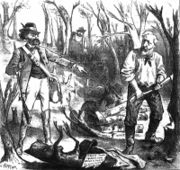
In 1876, he supported Hayes for President, and Hayes named him Secretary of the Interior, following much of his advice in other cabinet appointments and in his inaugural address. In this department, Schurz put in force his theories in regard to merit in the Civil Service, permitting no removals except for cause, and requiring competitive examinations for candidates for clerkships. His efforts to remove political patronage met with limited success. As an early conservationist, he prosecuted land thieves and attracted public attention to the necessity of forest preservation.
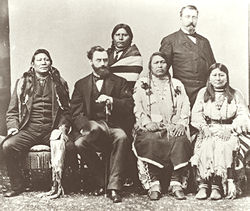
During Schurz's tenure as Secretary of the Interior, there was a movement, strongly supported by Gen. William Tecumseh Sherman, to transfer the Office of Indian Affairs to the War Department.[10] Restoration of the Indian Office to the War Department, which was anxious to regain control in order to continue its "pacification" program, was opposed by Schurz, and ultimately the Indian Office remained in the Interior Department. The Indian Office had been the most corrupt of the Interior Department. Positions there were based on political patronage and seen as granting license to use the reservations for personal enrichment. Schurz realized that the service would have to be cleansed of corruption before anything positive could be accomplished, so he instituted a wide-scale inspection of the service, dismissed several officials, and began civil service reforms, where positions and promotions were based on merit, not political patronage.[11]
Schurz's leadership of the Indian Affairs Office was not uncontroversial. While certainly not an architect of the campaign to push Native Americans off their lands and into tribal reservations, Schurz continued the previous practice of the Bureau of Indian Affairs of resettling tribes on reservations. In response to several nineteenth century reformers, however, Schurz later rescinded his approval of the policy of removing Indians from their homelands, promoting assimilationist policies that were in favor among reformers at the time.[12][13]
New York City
Upon leaving the Interior Department in 1881, Schurz moved to New York City. That year Henry Villard acquired the New York Evening Post and The Nation and turned the management over to Schurz, Horace White and Edwin L. Godkin.[14] Schurz left the Post in the autumn of 1883 because of differences over editorial policies regarding corporations and their employees.[15] In 1884, he was a leader in the Independent (or Mugwump) movement against the nomination of James Blaine for president and for the election of Grover Cleveland. From 1888 to 1892, he was general American representative of the Hamburg American Steamship Company. In 1892, he succeeded George William Curtis as president of the National Civil Service Reform League and held this office until 1901. He also succeeded Curtis as editorial writer for Harper's Weekly in 1892 and held this position until 1898. In 1895 he spoke for the Fusion anti-Tammany Hall ticket in New York City. He opposed William Jennings Bryan for president in 1896, speaking for sound money and not under the auspices of the Republican party; he supported Bryan four years later because of anti-imperialism beliefs, which also led to his membership in the American Anti-Imperialist League. In the 1904 election he supported Alton B. Parker, the Democratic candidate. Carl Schurz lived in a summer cottage in Northwest Bay on Lake George, New York which was built by his good friend Abraham Jacobi. Schurz died in New York City and is buried in Sleepy Hollow Cemetery, Sleepy Hollow, New York.
Opinions

Throughout his life, Schurz never hesitated to deliver his opinion, and was known by politicians as elevated as Presidents Lincoln[17] and Johnson for his frequent, vitriolic letters. Because of his strongly worded speeches and editorials and his deeply held convictions, he was a hero to his supporters, but widely disliked by his critics.
Immigrant connections
He had a strong connection to the immigrant community. He told a group of German immigrants at the Chicago World's Fair in 1893 how he expected them to fit into American society:
I have said: who does not honor the old fatherland is not worthy of the new, but I say also he is not worthy of the old fatherland who is not one of the most faithful citizens of the new. Noblesse oblige. To be a German now means more than it meant before he belonged to one united nation. He who calls himself a German now must never forget his honorable obligation to his name; he must honor Germany in himself. The German-American can accomplish great things for the development of the great composite nation of the new world, if in his works and deeds he combines and welds the best that is in the German character with the best that is in the American. — Carl Schurz,
German Day, June 15, 1893.
Publications
Schurz published a number of writings, including a volume of speeches (1865), a two-volume biography of Henry Clay (1887), essays on Abraham Lincoln (1899) and Charles Sumner (posthumous, 1951), and his Reminiscences (posthumous, 1907–09). His later years were spent writing the memoirs recorded in his Reminiscences which he was not able to finish — he only reached the beginnings of his U.S. Senate career.
Schurz on "The True Americanism"
What is the rule of honor to be observed by a power so strongly and so advantageously situated as this Republic is? Of course I do not expect it meekly to pocket real insults if they should be offered to it. But, surely, it should not, as our boyish jingoes wish it to do, swagger about among the nations of the world, with a chip on its shoulder, shaking its fist in everybody's face. Of course, it should not tamely submit to real encroachments upon its rights. But, surely, it should not, whenever its own notions of right or interest collide with the notions of others, fall into hysterics and act as if it really feared for its own security and its very independence. As a true gentleman, conscious of his strength and his dignity, it should be slow to take offense. In its dealings with other nations it should have scrupulous regard, not only for their rights, but also for their self-respect. With all its latent resources for war, it should be the great peace power of the world. It should never forget what a proud privilege and what an inestimable blessing it is not to need and not to have big armies or navies to support. It should seek to influence mankind, not by heavy artillery, but by good example and wise counsel. It should see its highest glory, not in battles won, but in wars prevented. It should be so invariably just and fair, so trustworthy, so good tempered, so conciliatory, that other nations would instinctively turn to it as their mutual friend and the natural adjuster of their differences, thus making it the greatest preserver of the world's peace. This is not a mere idealistic fancy. It is the natural position of this great republic among the nations of the earth. It is its noblest vocation, and it will be a glorious day for the United States when the good sense and the self-respect of the American people see in this their "manifest destiny." It all rests upon peace. Is not this peace with honor? There has, of late, been much loose speech about "Americanism." Is not this good Americanism? It is surely today the Americanism of those who love their country most. And I fervently hope that it will be and ever remain the Americanism of our children and our children's children.
– Carl Schurz,
"The True Americanism", address delivered in New York City at a meeting of the Chamber of Commerce of the State of New York, January 2, 1896.
Schurz on Patriotism
The man who in times of popular excitement boldly and unflinchingly resists hot-tempered clamor for an unnecessary war, and thus exposes himself to the opprobrious imputation of a lack of patriotism or of courage, to the end of saving his country from a great calamity, is, as to "loving and faithfully serving his country," at least as good a patriot as the hero of the most daring feat of arms, and a far better one than those who, with an ostentatious pretense of superior patriotism, cry for war before it is needed, especially if then they let others do the fighting.
– Carl Schurz,
"About Patriotism", Harper’s Weekly, April 16, 1898.
Schurz expanded on this theme in a speech delivered at the Anti-Imperialistic Conference in Chicago, Illinois, October 17, 1899:
I confidently trust that the American people will prove themselves … too wise not to detect the false pride or the dangerous ambitions or the selfish schemes which so often hide themselves under that deceptive cry of mock patriotism: "Our country, right or wrong!" They will not fail to recognize that our dignity, our free institutions and the peace and welfare of this and coming generations of Americans will be secure only as we cling to the watchword of true patriotism: "Our country—when right to be kept right; when wrong to be put right."
– Carl Schurz,
"The Policy of Imperialism", in Speeches, Correspondence
and Political Papers of Carl Schurz, vol. 6 (1913), pp. 119–20..
In memoriam
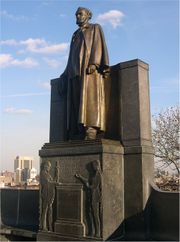
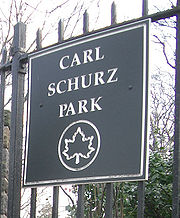
Schurz is memorialized in numerous places around the United States:
- Carl Schurz Park, a 14.9 acre (60,000 m²) park in New York City, adjacent to Yorkville, Manhattan, overlooking the waters of Hell Gate. Named for Schurz in 1910, it is the site of Gracie Mansion, the residence of the Mayor of New York since 1942
- Karl Bitter's 1913 statue of Schurz at Morningside Drive and 116th Street in New York City
- Carl Schurz and Abraham Jacobi Memorial Park in Bolton Landing, New York
- Schurz, Nevada named after him
- Carl Schurz Drive, a residential street in the northern end of his former home of Watertown, Wisconsin
- Schurz Elementary School, in Watertown, Wisconsin
- Carl Schurz Park, a private membership park in Stone Bank (Town of Merton), Wisconsin, on the shore of Moose Lake
- Schurz Monument ("Our Greatest German American") in Menominee Park, Oshkosh, Wisconsin[2]
- Carl Schurz High School, a historic landmark in Chicago, built in 1910.
- Schurz Hall, a student residence at the University of Missouri.
- Carl Schurz Elementary School in New Braunfels, Texas
- Mount Schurz, a mountain in eastern Yellowstone, north of Eagle Peak and south of Atkins Peak, named in 1885 by the United States Geological Survey, to honor Schurz's commitment to protecting Yellowstone National Park
- In 1983, the U.S. Postal Service issued a 4-cent Great Americans series postage stamp with his name and face
- In World War II the United States liberty ship SS Carl Schurz was named in his honor.
- The U.S.S. Carl Schurz was commissioned in 1917 as a Patrol Gun Boat. Formerly the small unprotected cruiser S.M.S. Geyer of the German Imperial Navy, the ship had been taken over by the U.S. Navy when hostilities between Germany and the U.S. commenced, after having been interned in Honolulu in 1914. The Schurz sank after a collision in April 1918 off Beaufort Inlet, Florida.
Several memorials in Germany also commemorate the life and work of Schurz:
- Streets named after him in Berlin-Spandau, Bremen, Stuttgart, Erftstadt-Liblar, Giessen, Heidelberg, Karlsruhe, Köln, Rastatt, Paderborn, Pforzheim, Pirmasens, Leipzig, Wuppertal
- Schools in Bonn, Bremen, Berlin-Spandau, Frankfurt am Main, Rastatt and his place of birth, Erftstadt-Liblar
- The Carl Schurz Haus in Freiburg im Breisgau is an innovative institute (formerly Amerika-Haus) fostering German-American cultural relations
- an urban area in Frankfurt am Main
- the Carl Schurz Bridge over the Neckar River[3]
- a memorial fountain as well as the house where Lt. Schurz was billeted in 1849 in Rastatt
- German Armed Forces barracks in Hardheim
- German federal stamps in 1952 and 1976
The United States Army base in Bremerhaven, Germany was also named for Schurz - Karl Schurz Kaserne. The base served as a logistical hub for U.S. forces in Germany. The base was returned to the German government in 1996, following the end of the Cold War.
Schurz was portrayed by Edward G. Robinson in John Ford's film Cheyenne Autumn (1963), which shows in part his efforts to secure fair treatment for Native Americans.
Harper's Weekly Gallery
 Schurz and other anti-Grant "conspirators" — March 16, 1872 |
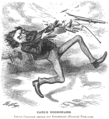 French Arms investigation — May 11, 1872 |
 Schurz and his victims — September 7, 1872 |
 Schurz leaves the U.S. Senate — March 20, 1875 |
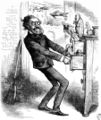 Schurz reforms the Indian Bureau — January 26, 1878 |
 Schurz counsels a wounded settler — December 28, 1878 |
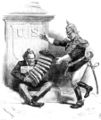 Schurz and Wilhelm II — July 14, 1900 |
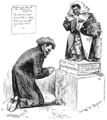 Schurz and Emilio Aguinaldo — August 9, 1902 |
See also
- List of American Civil War generals
- Forty-Eighters
- German American
- German-American Heritage Foundation of the USA
References
- Eicher, John H., and Eicher, David J., Civil War High Commands, Stanford University Press, 2001, ISBN 0-8047-3641-3.
- Yockelson, Mitchell, "Hirschhorn", Encyclopedia of the American Civil War: A Political, Social, and Military History, Heidler, David S., and Heidler, Jeanne T., eds., W. W. Norton & Company, 2000, ISBN 0-393-04758-X.
 Chisholm, Hugh, ed (1911). "Schurz, Carl". Encyclopædia Britannica (Eleventh ed.). Cambridge University Press.
Chisholm, Hugh, ed (1911). "Schurz, Carl". Encyclopædia Britannica (Eleventh ed.). Cambridge University Press.
Notes
- ↑ Wisconsin Historical Society: Schurz, Carl 1829 - 1906
- ↑ Schurz, Margarethe [Meyer] (Mrs. Carl Schurz) 1833 - 1876
- ↑ "Nation's Orators Glorify Schurz; Carnegie Hall Memorial a People's Tribute. Country Needs Such Men; Chairman Choate Rebukes New York Senators -- Cleveland, Eliot and Others Speak," New York Times. November 22, 1906. These tributes are available in Wikisource at Addresses in Memory of Carl Schurz.
- ↑ Schurz, Carl, remarks in the Senate, February 29, 1872, The Congressional Globe, vol. 45, p. 1287. See Wikisource for the complete speech.
- ↑ Schurz, Carl. Reminiscences, Vol. 1, pp. 93-94.
- ↑ Van Cleve, Charles L. (1902). Phi Kappa Psi Fraternity From Its Foundation In 1852 To Its Fiftieth Anniversary. p. 209: Philadelphia: Franklin Printing Company.
- ↑ Schurz, Reminiscences, Vol. 1, Chap. 6, pp. 159.
- ↑ Hirschhorn, p. 1713.
- ↑ This story, and the conflict between Nast and Harper's editorial writer George William Curtis, is related by Albert Bigelow Paine in Thomas Nast: His Period and His Pictures, 1904.
- ↑ "ARMY CHARGES ANSWERED; THE INDIAN SERVICE UPHELD BY MR. SCHURZ. WHY IT WOULD BE UNWISE TO TRANSFER THE INDIAN BUREAU TO THE WAR DEPARTMENT--INCONSISTENT AND INACCURATE STATEMENTS BY MILITARY OFFICERS--LOOSE MANAGEMENT UNDER THE ARMY. INCONSISTENT AND INACCURATE STATEMENTS BY ARMY OFFICERS. ALLEGED ARMY DISHONESTY. MEASURES OF IMPORTANCE. MR. SCHURZ CROSS-EXAMINED. OTHER WITNESSES," The New York Times, December 7, 1878, p. 5 [1]
- ↑ Trefousse, Hans L., Carl Schurz: A Biography, (U. of Tenn. Press, 1982)
- ↑ Hoxie, Frederick E. A Final Promise: The Campaign to Assimilate the Indians, 1880-1920, Lincoln, NE: University of Nebraska Press, 1981.
- ↑ "Annual Report of the Secretary of the Interior, November 1, 1880," In Prucha, Francis Paul, ed., Documents of United States Indian Policy, Lincoln, NE: University of Nebraska Press, 2000. See Google Books.
- ↑ Oswald Garrison Villard (1936). "White, Horace". Dictionary of American Biography. New York: Charles Scribner's Sons.
- ↑ “No Longer an Editor; Carl Schurz Severs his Connection with the 'Evening Post'.” The New York Times, December 11, 1883
- ↑ Sturm und Drang Over a Memorial to Heinrich Heine. The New York Times, May 27, 2007.
- ↑ Wikisource has the text of two noted letters to Lincoln, and Lincoln's replies. See Letter from Carl Schurz to Abraham Lincoln, November 8, 1862.
Further reading
- Schurz, Carl. The Reminiscences of Carl Schurz (three volumes), New York: McClure Publ. Co., 1907-08. Schurz covered the years 1829-1870 in his Reminiscences. He died in the midst of writing them. The third volume is rounded out with A Sketch of Carl Schurz's Political Career 1869-1906 by Frederic Bancroft and William A. Dunning. Portions of these Reminiscences were serialized in McClure's Magazine about the time the books were published and included illustrations not found in the books.
- Bancroft, Frederic, ed. Speeches, Correspondence, and Political Papers of Carl Schurz (six volumes), New York: G. P. Putnam's Sons, 1913.
- Brown, Dee, Bury My Heart at Wounded Knee, 1971
- Donner, Barbara. "Carl Schurz as Office Seeker," Wisconsin Magazine of History, vol. 20, no.2 (December 1936), pp. 127–142.
- Donner, Barbara. "Carl Schurz the Diplomat," Wisconsin Magazine of History, vol. 20, no. 3 (March 1937), pp. 291–309.
- Fish, Carl Russell. "Carl Schurz-The American," Wisconsin Magazine of History, vol. 12, no. 4 (June 1929), pp. 346–368.
- Fuess, Claude M. Carl Schurz, Reformer, (NY, Dodd Mead, 1932)
- Schafer, Joseph. "Carl Schurz, Immigrant Statesman," Wisconsin Magazine of History, vol. 11, no. 4 (June 1928), pp. 373–394.
- Schurz, Carl. Intimate Letters of Carl Schurz 1841-1869, Madison: State Historical Society of Wisconsin, 1928.
- Trefousse, Hans L. Carl Schurz: A Biography, (1st ed. Knoxville: U. of Tenn. Press, 1982; 2nd ed. New York: Fordham University Press, 1998)
- Twain, Mark, "Carl Schurz, Pilot," Harper’s Weekly, May 26, 1906.
External links
- Carl Schurz at the Biographical Directory of the United States Congress Retrieved on 2008-08-12
- Works by Carl Schurz at Project Gutenberg
- Works of Carl Schurz
 The Reminiscences of Carl Schurz at Wikisource.
The Reminiscences of Carl Schurz at Wikisource. Twain, Mark. Carl Schurz, Pilot, Harper's Weekly, May 26, 1906, p. 727.
Twain, Mark. Carl Schurz, Pilot, Harper's Weekly, May 26, 1906, p. 727.- Reynolds, Robert L. "A Man of Conscience", American Heritage Magazine, vol. 14, no. 2 (1963).
- "Schurz: The True Americanism" Harper's Magazine, November 1, 2008.
- "Carl Schurz" from Charles Rounds, Wisconsin Authors and Their Works, 1918.
- The Political Graveyard
- Abraham Lincoln's White House - Carl Schurz
Sister projects
 Media related to Carl Schurz at Wikimedia Commons
Media related to Carl Schurz at Wikimedia Commons Works related to Carl Schurz at Wikisource
Works related to Carl Schurz at Wikisource German Wikisource has original text related to this article: Carl Schurz
German Wikisource has original text related to this article: Carl Schurz
| Diplomatic posts | ||
|---|---|---|
| Preceded by William Preston |
U.S. Minister to Spain 1861 |
Succeeded by Gustavus Koerner |
| United States Senate | ||
| Preceded by John B. Henderson |
United States Senator (Class 1) from Missouri 1869–1875 Served alongside: Charles D. Drake, Daniel T. Jewett, Francis P. Blair, Jr., Lewis V. Bogy |
Succeeded by Francis M. Cockrell |
| Political offices | ||
| Preceded by Zachariah Chandler |
United States Secretary of the Interior Served under: Rutherford B. Hayes 1877–1881 |
Succeeded by Samuel J. Kirkwood |
| Military offices | ||
| Preceded by John Sedgwick |
Commander of the XI Corps (ACW) January 19, 1863 - February 5, 1863 |
Succeeded by Franz Sigel |
| Preceded by Adolph von Steinwehr |
Commander of the XI Corps (ACW) March 5, 1863 - April 2, 1863 |
Succeeded by Oliver O. Howard |
|
||||||||||||||
|
|||||||
|
||||||||||
|
||||||||||||||||||||||||||||


